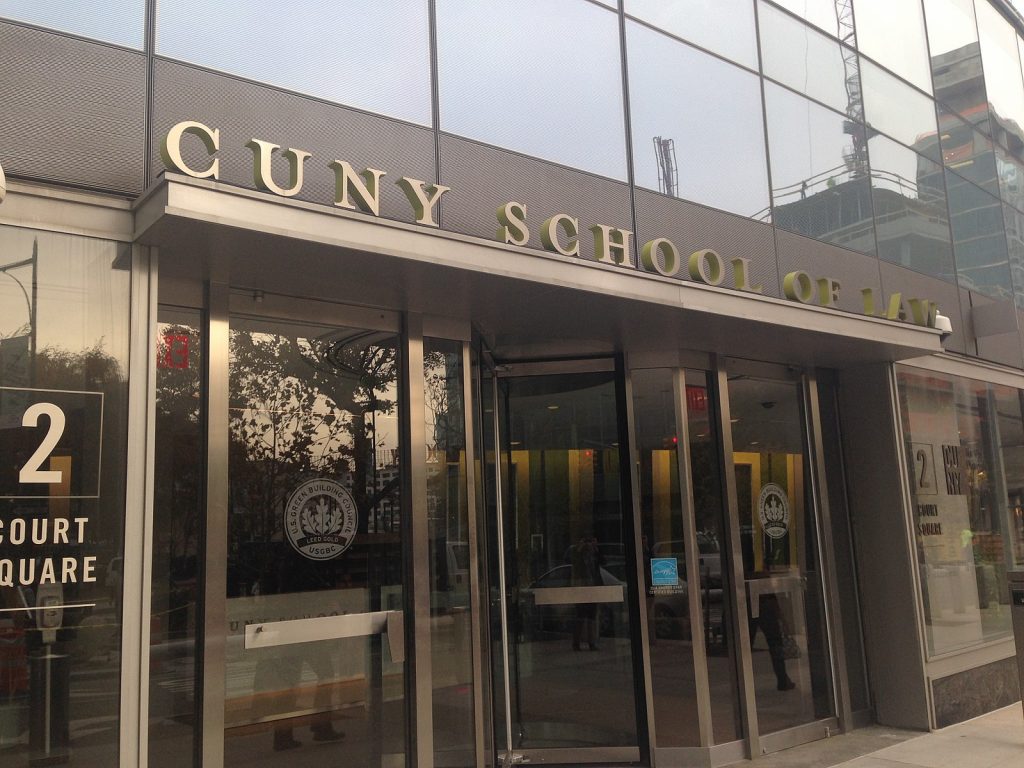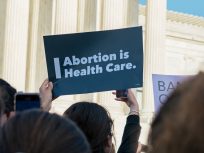
CUNY Students for Justice in Palestine, Jewish Law Students’ Association face administrative roadblocks after passing BDS resolution
In December, 2021, the City University of New York (CUNY) Law Student Government Association’s passed a BDS resolution. BDS, which stands for boycott, divestment, and sanctions, is a Palestinian-led movement for freedom, justice and equality that calls for the end of Israel-occupation of Palestinian land.
CUNY students’ resolution, which was co-sponsored by Students for Justice in Palestine and the Jewish Law Students’ Association, called for a boycott of Israel companies that support Israel’s occupation of Palestine. The resolution specifically called out CUNY’s complicity in Israel apartheid “through its investments in and contracts with companies profiting off of Israeli war crimes.” This resolution was unanimously endorsed by CUNY Law’s faculty in May.
In response, CUNY Chancellor Matos Rodríguez released a statement condemning the resolution and refused the students’ demand to terminate exchange programs and divest from CUNY involvement with companies’ that supported and profited off Israel’s occupation and colonization.
Despite the Chancellor’s rejection of the resolution, politicians have threatened to pull CUNY Law’s funding over its endorsement of the students’ demands and held hearings on the alleged “antisemitism” illustrated by the BDS proposal.
In October, 2022 Rodríguez has promised to allocate over $750,000 to support Jewish students, which includes more Israel study abroad programs, to combat the backlash CUNY has received from the BDS proposal.
SAFE CUNY, a self-proclaimed Zionist advocacy group, has continued to demand that CUNY adopt the International Holocaust Remembrance Alliance (IHRA) definition of antisemitism, but CUNY4Palestine students contend that this lobbying is an example of political repression.
Anti-BDS Legislation
These CUNY students are part of a larger BDS movement which has been targeted by private repression, explains Amal Thabateh, Michael Ratner Justice Fellow at Palestine Legal. Thabateh explains that in addition to this repression, BDS activists have also faced repression from lawmakers that have passed legislations that stifles first-amendment protected boycotts.
“Since 2014, anti-boycott legislation targeting the movement for Palestinian rights has been introduced in federal, state, and local legislatures and adopted by executive order,” Thabateh explains. “This type of legislation generally attempts to use economic coercion to suppress boycotts, primarily through prohibitions on state contracts with and state investment in individuals and entities that boycott in support of Palestinian rights.”
In the past 8 years, 34 states have enacted anti-boycott laws, despite resistance from civil liberties groups. These laws typically apply only to public contracts, but Thabateh contends that they often lead to a chilling of speech and advocacy.
This summer, one such law in Arkansas was upheld as constitutional in the Eighth Circuit, despite departing from existing precedent. BDS activists have voiced concern about the potential for these laws to be expanded to target other social justice movements and endanger activists’ right to dissent.
“The impact of legislation targeting Israel boycotts goes far beyond chilling advocacy for Palestinian rights,” Thabateh explains. “Anti-Israel boycott laws have become a model for other types of anti-boycott legislation targeting protest in support of other social justice issues. A dozen states have introduced or passed anti-boycott legislation, for example: targeting efforts to address climate change or gun violence.”
Limitations of the Law and the Chevron Campaign
Legal activists have argued that the American legal system does not protect Palestinians rights and other social movement activists. This is why BDS activists prioritize boycotts, divestment, and sanctions.
“The law, constitution and SC have all been used at times to uphold discriminatory and violent policies. Advocacy for Palestinian rights exposes part of the cracks in the country’s foundation – where rights like that to free speech do not apply to those who challenge the injustices of the US or its allies. This is why it’s so important to continue to raise awareness and to organize,” explains Thabateh.
One of the BDS Movement’s newest campaigns tackles the connection between climate degradation and Israeli apartheid. Activists have organized a consumer boycott and divestment campaign targeting fossil fuel giant Chevron and Siemens, a multinational technology company.
BDS activists have alleged that over 90% of Israel’s electricity production comes from fossil fuels that harms the environment and fuels Israel’s illegal occupation of Palestine. Organizers contend that Chevron and Siemens are not only profiting off of Israeli apartheid and Israel’s human rights violations in Gaza but also the climate crisis which will disproportionately affect indigenous people and people in the Global South.
Chevron, which produced 1.8 million barrels of oil and natural gas in 2021, entered into an agreement with Noble Energy in 2020 which operated two major natural gas fields In Israel to buy all outstanding stock. International environmental groups, including Alistar International, Amazon Watch, and Greenpeace Israel, cautioned Israel’s Energy Ministry’s Petroleum Council to not approve this deal, citing Chevron’s history on noncompliance and environmental violations. Despite environmental groups’ warnings, the deal was approved. BDS activists also insist that gas produced by Chevron is being transported to Egypt though the Arish-Ashkelon pipeline, which illegally crosses the Palestinian Exclusive Economic Zone (EEZ) in Gaza and that the company may be implicated in the extraction of off-short Palestinian gas reserves.
“The pipeline crosses Gaza waters 13 miles from the coast in the Palestinian EEZ, where third parties are required to obtain Palestinian approval and pay transit fees. All of this has been ignored by Israel and the complicit corporations involved,” explains Riccardo Carraro, a BDS International Campaigns Officer. “Apartheid Israel doesn’t respect Palestinian sovereignty over natural resources, including the sea, in the EEZ,” he continues. “It has rather heavily militarized Gaza’s Sea.”
Siemens is similarly accused of enabling Israeli’s illegal settlement and annexation policies. In 2020 German conglomerate Siemens was selected as the main contractor for the EuroAsia Interconnector project, an under water electricity cable that will export Israeli produced electricity to the European Union. BDS organizers have alleged that this subsea cable will financially support the Israeli occupation of Palestine in addition to supporting fossil fuel companies exacerbate the climate crisis.
A legal briefing by the Palestinian Human Rights Organizations Council (PHROC), a coalition of human rights organizations established to promote Palestinian sovereignty, supports these allegations by BDS organizers. In the report, PHROC advised that “the implementation of this project would contribute to the further entrenchment of Israel’s illegal settlements, its ongoing de facto annexation and planned de jure annexation of occupied Palestinian territory.” On October 5th, 2022, PHROC released an open letter to Siemens calling on the corporation to respect intentional humanitarian law and withdraw from work on the Israel-Cyprus segment of the Interconnector.
The Palestinian BDS National Committee, the broadest Palestinian civil society coalition that works to lead and support the BDS movement for Palestinian rights, has organized the BDS campaign against Chevron and Siemens in solidarity with the climate justice movement. “Climate change is everywhere a field where the deep injustice caused by colonialism’s legacy is highly visible: it is a natural consequence that this happens also in Palestine where settler-colonialism continues today,” Carraro explains when asked about the connection between colonialism, climate change, and Palestinian sovereignty. “Our campaign that addresses explicitly the connection between climate change and colonialism is a possible challenge to that system of colonial power domination and oppression.”
To pressure these companies to #StopFuelingIsraeliApartheid, the BDS movement has asked their supporters to boycott the companies until they terminate their business involvements with Israel, have called for the exclusion of Siemens and Chevron from future public and private contracts, and have demanded investment and pension funds to divest from these companies until they terminate their business involvement with the EuroAsia Interconnector. “Our campaign aims at demolishing both of them, unmasking the truth and struggling against apartheid and climate change,”Carraro says.
#StopFuelingIsraeliApartheid and #cuny4palestine are both examples of organizing and resisting in a legal system that targets and oppresses activists and their ability to boycott and voice dissent. Thabateh is adamant that BDS activists will not let repressive laws and policies stop them. “Even as these battles play out in courtrooms and capitals,” Thabateh says, “the critical work of organizing continues toward our ultimate goal: freedom and justice in Palestine, the U.S. and beyond.”




